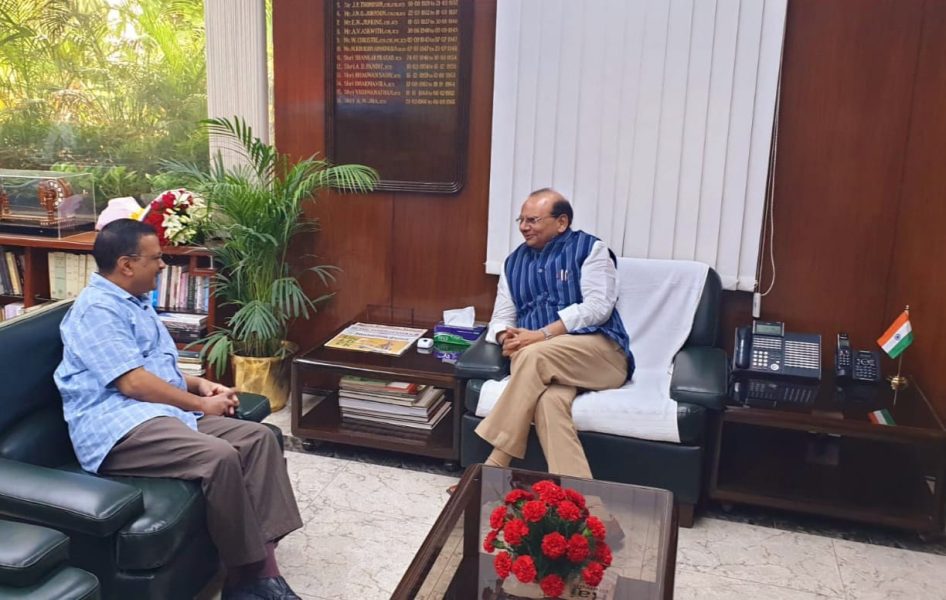
Showdown between L-G and Delhi CM: What lies behind the vexed MCD imbroglio

Days after the maiden session of the newly elected house of the Municipal Corporation of Delhi was adjourned abruptly, leaders of both the AAP and BJP continue to stage protests and sit-in demonstrations in multiple locations across the capital.
In two separate letters addressed to the Lieutenant-Governor (L-G), Delhi Chief Minister Arvind Kejriwal has alleged that the L-G usurped the powers of the elected government by issuing orders on every ‘transferred’ subject. Subjects in control of an elected government are called ‘transferred’ subject. Constitutionally, three key subjects — public order, police and land — are with the Central government and the Centre exercises its jurisdiction over these subjects via the L-G.
The GNCTD Act
Under the Government of National Capital Territory of Delhi (Amendment) Act, 2021,”government” now means the L-G. The Delhi government has to take permission from the L-G before taking any action on subjects that had so far been under its control.
Also read: MCD clashes: AAP questions L-G on oath to aldermen ahead of elected councillors
This has been a major bone of contention between the city government and the L-G, with Kejriwal clearly seeking an answer whether L-G intends to run the elected govt by bypassing the Delhi government on ‘all transferred subjects’
The issue of ‘Control’
In the letter, Kejriwal has also alleged that L-G issues directions directly to the chief secretary, who in turn gets them implemented bypassing the elected government. He also claims that the control over ‘bureaucracy’ through ‘services’ is being misused. These allegations assume greater importance as a significant hearing related to the issue of services is scheduled in the Supreme Court during this week.
In the vexed dispute between the Centre and the Delhi government over ‘services’, the Delhi High Court has ruled that Delhi being a Union territory, ‘ services’ in Delhi government come under the control of the central government, and by extension to the L-G of Delhi.
Insisting on confidentiality, a top official of the Delhi government outrightly rejected Kejriwal’s allegations that bureaucrats perform under fear as they risk being transferred or suspended. “This is absolutely not true, we perform according to the constitution and adhere to all such provisions,” remarked the official.
The presiding officer and aldermen
Highlighting the convention, Kejriwal draws attention to the fact that the presiding officer, the senior-most member of the House, cutting across party lines, is nominated by the state government for the job. He said the elected government was kept in the dark even though the constitution empowers the elected government to nominate the first presiding officer since it is a transferred subject.
In the meantime, Raj Niwas officials, referring to the Delhi Municipal Corporation Act, stated that presiding officer is to be nominated by the administrator, which means the L-G. Dismissing CM’s allegations, Raj Niwas also said that the L-G through a process of elimination had shortlisted from a list of six names sent by the Delhi government.
CM’s office responded to the statement by saying that the L-G was “bound by the aid and advice” of the council of ministers in connection with this subject
In the meantime, Raj Niwas officials referring to the Delhi Municipal Corporation Act, 1957, state that presiding officer is to be nominated by the administrator, which means the L-G.
Latest flashpoint
The Delhi government has alleged that the L-G has bypassed procedural norms once again with regard to the reconstitution of Delhi State Haj Committee. L-G had nominated six members of the committee.
The AAP claimed that this was a violation of Transaction of Business of Government of NCT Delhi Rules, 1993.
However, Raj Niwas wrote back saying that nominations fell under the purview of Union list and not concurrent list, thereby falling under L-G Vinai Kumar Saxena’s capacity as an administrator.
Article 239AA of the Constitution was added in 1991 to provide for the creation of Delhi government with an assembly and the resultant Transaction of Business of Government of NCT Delhi Rules, 1993, to come to the conclusion that “the services under the NCT of Delhi are necessarily the services of the Union and they are expressly covered only by Entry 70 of List I”.
The settled part
Speaking to The Federal, Rajesh Kumar, constitutional expert said: “In view of the mandates of Article 239AA of the Constitution, the aid and advice of the Council of Ministers of NCT of Delhi is binding upon the Administrator/Lt Governor; however, the caveat, which is read into it by the Supreme Court, is that such compulsion is only with respect to those laws/area of work for which the Council of Ministers are competent to make laws.”
Also read: Delhi LG nominating BJP workers for MCD, alleges AAP
As the DMC Act, 1957, is a Union law which specifically confers discretion upon the Administrator for such appointment of person of specific knowledge, whether he is bound to take aid and advice of the council of minister seems unlikely at the presently prevailing laws. The issue must be examined in view of the generality of article 239AA and Chapter IXA of the Constitution, reiterated the expert.
As per various SC judgements, L-G/ Administrator is bound by the aid and advice of the council of ministers on all but reserved subject. “Delhi Municipal Corporation Act is a transferred subject and even if the words used in the Act are L-G or Administrator”, L-G is bound by the aid and advice of the council of minister on the subject, said Kejriwal.

